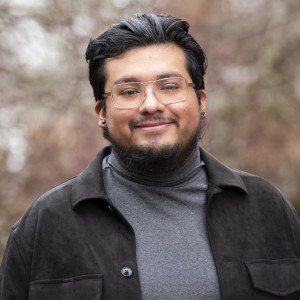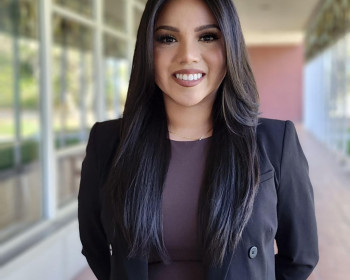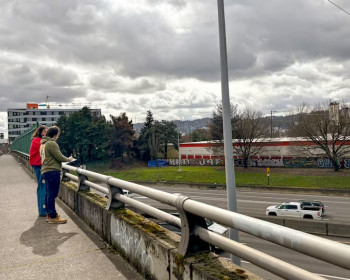Isaias Sanchez
(he/him)
Isaias Sanchez wanted to conduct meaningful research as a graduate student. He found that opportunity with Professor Joslyn Armstrong, co-creating the workshop: Creating a Safe Space: Working with Latino & Black Men in Therapy.

Seeking a professor whose research aligned with his interests, Sanchez soon connected with Professor Joslyn Armstrong around her work examining Black father-child relationship quality, father identity, child outcomes, and racial discrimination.
“Professor Armstrong believed in my ability to lead a presentation and also to dive deeper into my own passion of bringing awareness of issues happening within the Latino community,” says Sanchez.
With Professor Armstrong’s guidance, Sanchez co-created the workshop: Creating a Safe Space: Working with Latino & Black Men in Therapy. During their interactive presentation, “participants addressed relational and systemic challenges Latino and Black men experience, and the need in therapy for safe spaces. By creating safe spaces, therapists are providing room for their Latino and Black male clients to express their vulnerability without fear or shame.”
The workshop addressed how, in some cultures, restricting men’s masculinity can feel vulnerable.
“In Latino culture, masculinity revolves around being machismo, which is having and reflecting a strong masculine pride,” explains Sanchez. “In Black culture, men find it difficult to be vulnerable without appearing “weak”. In these societies, there are few places for men to be vulnerable and emotional.”
Sanchez notes that he was able to extend the reach of his research by working with professors from different universities who helped to expand his knowledge. He hopes his work leads to new courses being offered in the MCFT program that address the barriers that exist in underrepresented communities, such as intergenerational trauma and language barriers.
Sanchez also says that this is only the beginning of his work with Latino and Black men.
“I believe that creating safe spaces for the Latino community to access mental health care is imperative. Mental illness exists amongst this community, but barriers do too that prevent men from accessing the mental health care they need.”
Sanchez himself identifies as a member of the Latino community, noting that there has been a “negative stigma of mental health, but also of help-seeking.” He hopes that his work can help lower his community members’ guard, bring curiosity about the idea of therapy, and break down traditional gender roles and toxic masculinity.
As Sanchez reflects on his work with Professor Armstrong, he attributes his success to constant communication and strong relationship building between the two of them as collaborators and presenters. As these connections have grown, so has the complexity of their conversations when applying theory to their work. Sanchez has found genuine honesty from Professor Armstrong about everything in regards to completing applications to conferences to how he will approach co-facilitation.
For prospective or current graduate students who may also be interested in research, Sanchez has this advice to share:
“Reach out to professors. They want you to ask questions and are looking for students who want to conduct research. Even if a professor may not be able to take on a student at that particular moment, they may be able to connect you with other professors in the program or outside of the program to see if they have opportunities that match your needs and interests.”

